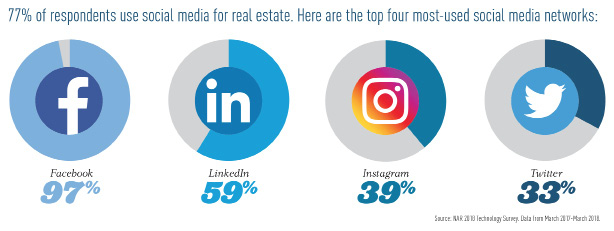Will technology make REALTORS® obsolete?
By Myrna Traylor
These days, a growing number of traditional businesses are looking over their shoulders, worried that their segment’s version of an Amazon or Expedia will not only disrupt their industry, but take it over entirely. REALTORS® have had some anxiety as internet-based real estate platforms and tech tools have edged into their markets. So far, however, most REALTORS® have made peace with technology, becoming adept at using the tools that work best for them and their clients, while keeping a wary eye out for the “killer app” that some mogul thinks will eliminate them.
Debra Bellmaine, CRS, broker associate with Stonebridge Real Estate in Clearwater, Florida, has a unique perspective on this issue. She was a software developer before becoming a REALTOR® in 2004.
“There is a great deal of fear being generated by the potential disruption of real estate by powerful tech platforms, and the iBuyer incursion in particular,” she says. “With the iBuyer platforms, the idea is that with the perfect tech, real estate transactions will be smooth, seamless, automated experiences for sellers and buyers, all conducted online. And if all real property was identical, all properties for sale occupying the same location, built the same year, with the same materials, in the same condition and so forth, it could easily be done that way. But that is not the reality with real property.”
Bellmaine described an experience she had with Opendoor, whose CEO, Eric Wu, touts a vision of a “future where everyone uses Opendoor to buy and sell their home in a frictionless transaction that is eventually low-cost or free,” according to a March 2019 article on Inman. Bellmaine was working with a buyer on an Opendoor listing, but she could not get anyone to answer questions about whether the property might have defects that would disqualify it for the FHA financing the buyer had secured. “I was never able to reach an agent at all, and so my buyers won’t be considering that property,” says Bellmaine.
“Eric Wu believes that his and other iBuyer platforms will turn agents into ‘advisers’ once the selling process is automated,” Bellmaine continues. “However, my one experience with Opendoor highlights the glaring issue: Individual and professional REALTORS® with a commission at stake will always strive to give superior and individual service to their sellers and buyers. Automation is only smooth as long as all the ball bearings are uniformly round and the same size. One flat ball bearing and the gears of automation grind to a halt.”
Of course, no REALTOR® can afford to be a complete luddite in this day and age. “New tech needs to be embraced,” says Job Hammond, CRS, at Dash Realty in Austin, Texas. “I have learned not only to understand technology, but to incorporate it into my business as a competitive differentiator. REALTORS® should not be scared of technology; we just have to deal with the fact that our clients are more adept than they used to be. They don’t have to use agents to access the MLS when they can do it in their pajamas.”
Chris Pelkola Lee, CRS, and broker-owner of simpLEE HOME in Idaho Falls, agrees.
“An educated client is a better client,” she says, “and the more resources they have access to, the better. Our role may be more consultative.” That said, Lee knows that not everyone “is going to Google all the information about inspections, taxes, assessments, appraisals and so forth, so I can still help them with that.”
The Sliding Scale
Clearly, individual agents and brokers must use technology to a greater or lesser extent in their own businesses. The level of technological immersion can be a matter of preference, necessity or even location. For example, Lee reports that because Idaho is a nondisclosure state, the listings buyers find on Zillow aren’t always completely accurate or up to date. There aren’t any iBuyer platforms in her part of the state, either.
Social media and email are, of course, critical marketing tools. Tracy Kirkley, CRS, vice president and broker at Crye-Leike in Olive Branch, Mississippi, relies on video to deliver news to her market quickly. “When I have great information that can impact a large group of my clients, instead of making tons of phone calls, I create a video and send it to them,” she says. “This way, I get my face in front of them, too, and they can replay the video later if they need to remember part of what I said.”
By using e-tools to write offer letters, Hammond is able to have his clients finalize their deals through DocuSign or with a digital pen. He has also set up an IDX (internet data exchange) link on his website that pings him when buyers who have registered with his site have looked at a property online a certain number of times. He can then set up an appointment with them through an app. “Using tech allows me to provide concierge-level service,” says Hammond. “Plus, I can open doors with my watch.”
Some REALTORS® have made the leap, joining internet-based real estate firms. “Because of the recent rumors about sites such as Zillow and Amazon taking over the real estate industry and replacing brokers and their agents, I joined eXp Realty to utilize their state-of-the-art cloud-based technology,” says Theresa Walters, CRS, in Sagamore Hills, Ohio. “The tools eXp Realty offers allow you to stay connected with clients at all times, anywhere in the world, and actually meet with them ‘face-to-face’ without their having to leave the comfort of their physical home or office. It saves a lot of time and gasoline.”

The Real Deal
When it comes to serving clients’ interests, though, nothing can replace an actual human being. Most of the CRSs we spoke with agree that while so much of real estate is making the numbers work for both clients and agents, it’s the interactions between them that make all the difference—plus a healthy dollop of experience and skill on the agent’s part.
Kirkley points out that there are intangibles that internet-based platforms can’t bring to bear. “I think the overall knowledge of a market allows us to guide our clients, especially seasonally. And home transactions represent major stress, as they are often done in the throes of a life change. My job requires being able to minimize stressors to the client.”
“For agents who have been in this business for years, we learn so many things as we go along,” says Kirkley. “Getting the house under contract is only half the job—there are so many hurdles to get over before a client gets the money or key.”
Andrea Swetland, CRS, with Vanguard Properties in San Francisco, acquired a buyer client through a secondary association with Redfin. When it turned out that the buyer couldn’t receive a discount on the price that Redfin initially offered because Swetland wasn’t a Redfin-employed agent, the buyer decided to stay with Andrea because they had established a rapport. They valued that relationship more than the discount.
“Clients would rather have someone who can hold their hand and walk them through things,” Swetland says. “People think they can keep things simple by using an internet-based deal, and then they get into it and realize it’s a complicated process. It also depends on the market; in San Francisco, you can’t just walk in and say, ‘Here’s my offer.’ We are still having multiple offers on 75% of properties; it’s very competitive.”
“Technology can never replace the human element of the real estate process,” says Hammond.
“This is not like buying books or even a car, for that matter—it’s often our clients’ largest financial decision and they need someone they can trust to guide them throughout the process. It is important to find a way to connect with your clients, their emotions and interests.”
And as REALTORS® know, that connection with clients is vital. “What happens when a client has a question?” Swetland asks. “Is there someone on call at night when they’re stressed out? I know what to say to talk them down: ‘You’re not alone—everybody feels that way. I feel that way when I buy a home.’”
“If you can emotionally connect with someone, just showing you truly care and are genuine will mean that you will have that client for life,” Walters says.
“Everybody wants to feel important and understood,” offers Kirkley. “And isn’t that what we all want?”
The Internet Can’t Wear All These Hats
Agents have a lot on their plates when it comes to making their clients happy and successful apart from the property sale or purchase. Whether you can call on training from an earlier career or develop the skills on the fly, an ability to play these uniquely human roles will solidify your relationships with your very human clients.
COUNSELOR
Because home sales are so emotionally fraught, “I feel like a part-time counselor,” says Job Hammond, CRS. “You’re not going to do too well for yourself or your clients if you don’t care about their concerns.”
FACILITATOR
An agent must have strong local connections. “An agent was handling a sale for her 93-year-old dad and the sellers were out of town,” says Tracy Kirkley, CRS. “I was able to get people into the house to get work done. My client told me, ‘I could not imagine handling all the things that needed to be done to get to closing without your help.’”
NEIGHBOR
Are you involved in your community? “Some people may decide to conduct their transactions online, but others want to know that the person they are dealing with is out in the community with skin in the game,” says Chris Pelkola Lee, CRS.
ADVISER
When buyers do so much online research—checking on things like adjacent lots or long-resolved community issues—that they manage to talk themselves out of every property, Betty Bargoli, CRS, can provide perspective. “It’s often a matter of presenting a picture that’s not as alarming and just saying, ‘Here’s the other side of that coin.’”
MOM!?
“I know that making a call or sending a personal note is the human part of real estate that technology cannot replicate in the same way,” offers Andrea Swetland, CRS. “Many of my clients call me a ‘mother’ or a ‘counselor.’ I listen to my clients and remind them that I am available to them even after the transaction is closed.”
How do you employ technology in your business? Share your story in our We Are CRS Facebook group!








